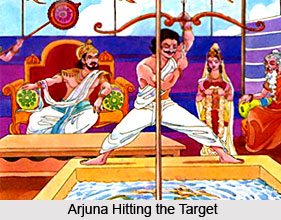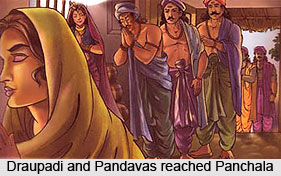 Marriage of Draupadi with the five Pandavas forms a vital portion of the great epic Mahabharata. While the Pandavas were living with their mother in the guise of Brahmans in the town of Ekachakra, there came one staunch friend and another out of their past life to visit them quietly. From one of those friends they heard that Drupada, the king of Panchalas, had announced the Swayamvara of his beautiful daughter Draupadi. A few more words passed with regard to the extraordinary charms and accomplishments of the princess of the Panchalas, and in the evening, when their guest had gone, Kunti noticed that her sons had fallen silent and listless. Then, guessing the cause of their changed spirits, she told to them with gentle tact that she was tired of Ekachakra and would be glad to renew their wanderings, if her sons would visit the country of the Panchalas.
Marriage of Draupadi with the five Pandavas forms a vital portion of the great epic Mahabharata. While the Pandavas were living with their mother in the guise of Brahmans in the town of Ekachakra, there came one staunch friend and another out of their past life to visit them quietly. From one of those friends they heard that Drupada, the king of Panchalas, had announced the Swayamvara of his beautiful daughter Draupadi. A few more words passed with regard to the extraordinary charms and accomplishments of the princess of the Panchalas, and in the evening, when their guest had gone, Kunti noticed that her sons had fallen silent and listless. Then, guessing the cause of their changed spirits, she told to them with gentle tact that she was tired of Ekachakra and would be glad to renew their wanderings, if her sons would visit the country of the Panchalas.
Pandavas reached Panchala
The next day all bade farewell to their Brahmin host of Ekachakra and set out for Kampilya, the capital of Drupada. As they went, they fell in with certain Brahmans going by the same road, who told them of the great bridal choice that was about to be held for the princess of the kingdom and of the royal largess to be given to wandering scholars on the very occasion. The princes, making as though they heard of these things for the first time, joined themselves to their company and announced their intention of witnessing the Swayamvara. And when they reached the city they went about it for a time as sightseers and at last took shelter in the guest-rooms of a certain potter.
Drupada had a desire marring off his daughter Draupadi to Arjuna but he had not disclosed his desire to anybody. After getting the news of the death of the Pandavas in the house of Lac, he somehow thought of their living somehow in the world and thus prepared a very stiff bow to be made and had a ring suspended at a very great height, and announced that he who would be able to string the bow and shoot his arrow through the ring should have the princess for his wife. With these words he proclaimed the Swayamvara, and kings, princes, and great sages began to pour in from all sides. Even Duryodhana came with his friend Karna attended the ceremony. And all were received by Drupada with lavish hospitality. But the Pandavas were living as beggars in the house of the potter, and none in entire city recognized them.
The festivities attendant on a royal wedding began, and every day waxed greater and greater, till on the sixteenth day, when everything was at its height, the great moment arrived.  The Princess Draupadi robed and jewelled, stepped into the arena, bearing a golden plate whereon lay a garland of flowers. As she entered, all music was stopped and the royal Brahmans lighted the sacrificial fire. Dhrishtadyumna, the brother of Draupadi, enumerated all the kings who were candidates for her hand and told her that he who should shoot the mark was to be chosen by her. And the name of Duryodhana came first, and Karna was mentioned, but none spoke the names of the five Pandavas, who, unknown to all, were present in the crowd as Brahmans.
The Princess Draupadi robed and jewelled, stepped into the arena, bearing a golden plate whereon lay a garland of flowers. As she entered, all music was stopped and the royal Brahmans lighted the sacrificial fire. Dhrishtadyumna, the brother of Draupadi, enumerated all the kings who were candidates for her hand and told her that he who should shoot the mark was to be chosen by her. And the name of Duryodhana came first, and Karna was mentioned, but none spoke the names of the five Pandavas, who, unknown to all, were present in the crowd as Brahmans.
As Dhrishtadyumna finished speaking their names the kings and princes all leapt to their feet, each was eager to be first in trying their luck. One after another, with hearts beating high, under the eyes of Drupada, in the blaze of the world and covered with glory, the candidates went forward to the shooting-place. And some with swelling lips and straining muscles laboured long to string that bow, and one after another, with crowns loosened and garlands torn, had to desist without success, being tossed to the ground by the resistance of the weapon. Then Karna, seeing the mortification of his friends and eager to show the glory of the knighthood, stepped forward quickly and seeing him, five seeming Brahmans amongst the spectators drew in their breath and were sure that Karna would will Draupadi, for they had no doubt that Karna could string the bow of Drupada. As Draupadi`s eyes fell on the hero, the princess exclaimed in cold tones of disdain that she would not marry the son of a charioteer. Hearing this from the princess, Karna smiled somewhat bitterly, glanced up at the sun, and cast aside the bow, already drawn to a circle.
Arjuna wins Draupadi
When the last of the monarchs was making his attempt, and their uniform failure was being discussed hotly by the spectators, Arjuna, with his deer-skin rug, his matted locks, and his sacred thread, rose from the crowd of Brahmans seated as onlookers on the outskirts of the arena and stepped forward to the shooting-dais. Arjuna walked up to the bow and stood before it like a mountain. Bending his head in prayer, he walked slowly round it. Then in the twinkling of an eye he strung it, and shooting five arrows in quick succession through the ring, he brought down the mark that had been suspended above. The cheering that followed seemed to come from the heavens as well as from the amphitheatre.
Flowers rained from the sky in all directions. And the bards immediately burst out into praises of the hero who had won. From the royal seats above the lists Drupada the king beamed approval on the young Brahman who had shot the mark, and the Princess Draupadi lifted her eyes to Arjuna and silently signified that she took him as her lord. The princes and kings present there unitedly attacked Drupada and the king of Panchala was protected well by Bhima and Arjuna. Then they returned to the place where Kunti was staying and told her to look at the thing they had bought with them. Without even looking at the fair princess, Kunti ordered the five brothers to share among them the gift they had own and thus abiding by the order of their mother the five Pandavas became the husbands of Draupadi.












